The Hitcher 4K Blu-ray Movie
HomeThe Hitcher 4K Blu-ray Movie 
Limited Edition / 4K Ultra HD + Blu-raySecond Sight | 1986 | 97 min | Rated BBFC: 15 | Sep 30, 2024
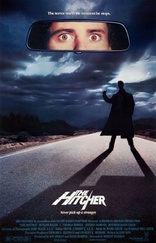
Movie rating
7.7 | / 10 |
Blu-ray rating
| Users | 5.0 | |
| Reviewer | 3.5 | |
| Overall | 3.8 |
Overview
The Hitcher 4K (1986)
A would-be samaritan picks up a hitchhiker and soon discovers the man is a relentless serial killer. Framed by the cold-blooded murderer for a string of slayings, his only help comes from a caring waitress as they attempt to flee from both the law and the hitcher.
Starring: Rutger Hauer, C. Thomas Howell, Jennifer Jason Leigh, Jeffrey DeMunn, John M. JacksonDirector: Robert Harmon
| Horror | Uncertain |
| Thriller | Uncertain |
Specifications
Video
Video codec: HEVC / H.265
Video resolution: 4K (2160p)
Aspect ratio: 2.40:1
Original aspect ratio: 2.39:1
Audio
English: DTS-HD Master Audio 2.0 (48kHz, 24-bit)
English: Dolby Atmos
English: Dolby TrueHD 7.1 (48kHz, 24-bit)
Subtitles
English SDH
Discs
Blu-ray Disc
Two-disc set (2 BDs)
4K Ultra HD
Playback
Region free
Review
Rating summary
| Movie | 4.0 | |
| Video | 3.5 | |
| Audio | 5.0 | |
| Extras | 5.0 | |
| Overall | 3.5 |
The Hitcher 4K Blu-ray Movie Review
Reviewed by Dr. Svet Atanasov October 5, 2024Robert Harmon's "The Hitcher" (1986) arrives on Blu-ray courtesy of Second Sight. The supplemental features on the release include new program with Robert Harmon; new program with screenwriter Eric Red; new program with cinematographer John Seale; new program with C. Thomas Howell; new program with composer Mark Isham; archival documentary; short films; vintage trailers; and more. In English, with optional English SDH subtitles for the main feature. Region-Free.
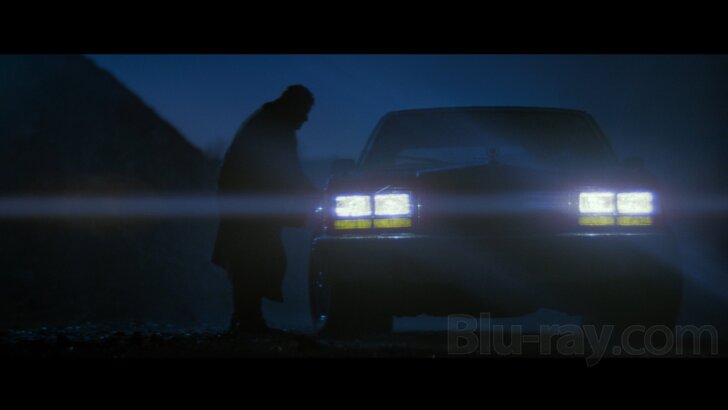
The Hitcher and Road Games are like twin brothers, but conceived at different places and shot to impress different crowds. They do some things differently that shape their personalities in unique ways, too, but their identical Ď80s genes are instantly recognizable and their most significant feature.
Robert Harmon worked with an original screenplay by Eric Red, which, while good, is essentially one rather basic blueprint because virtually everything that makes The Hitcher a fine genre film has something to do with the aura of its two male leads. (Isnít this the case with all fine genre films? No. Many excellent genre films are visual stunners whose ambience effectively overshadows their leads). The first is the great Dutch-born actor Rutger Hauer, who plays a manic on the loose somewhere in the dusty and always enormously atmospheric American Southwest. The second is the handsome and significantly younger C. Thomas Howell, who, while passing through the same area on a dark and rainy night, picks up Hauer and soon after has his world turned upside down. Jennifer Jason Leigh emerges half an hour later as a jaded bartender and slowly begins to trust Howell as he struggles to stay a few steps ahead of Hauer.
The narrative is broken into three uneven acts, each introducing predictable but wonderful character transformations. In the first and second, Hauer dominates and gradually forces Howell out of his boyish shell. The best material is in these two acts because both are infused with pure machismo of the meanest kind, which contemporary genre films can no longer tolerate. The third act is the shortest and most straightforward, but it is where all the great panoramic vistas from the American Southwest emerge. The blending of the mean machismo from the first two acts and the cinematic splendor from the third act is done very effectively and is one of the two key similarities between The Hitcher and Road Games.
The other key similarity between The Hitcher and Road Games is their willingness to overlap gialo and neo-noir aesthetics, and do so equally well. However, in the latter, the twisty narrative creates many excellent opportunities for the overlapping to occur, while in the former, all of it is coordinated with the progression of the character transformations. For this reason, one could successfully argue that the male leads in The Hitcher are a bit more impressive than the male and female leads in Road Games.
Another interesting similarity worth mentioning is that The Hitcher and Road Games were both lensed by Australian cinematographers. Harman worked with John Seale, whose special appreciation of natural light, shadow, and rugged terrains is of the kind that is typically suitable for the needs of established auteurs, not a young director making his feature film directorial debut.
A great electronic score from future Oscar nominee Mark Isham does a lot to establish and sustain the tense atmosphere of The Hitcher. Several of Ishamís original tracks, like Cars and Helicopters and Transfer, have a lot in common with the work of the legendary German ambient rockers Tangerine Dream, who scored such cult films as Thief, Risky Business and Miracle Mile.
Second Sightís combo pack release of The Hitcher introduces an exclusive new 4K restoration sourced from the original camera negative, which was supervised and approved by Harman.
The Hitcher 4K Blu-ray Movie, Video Quality 
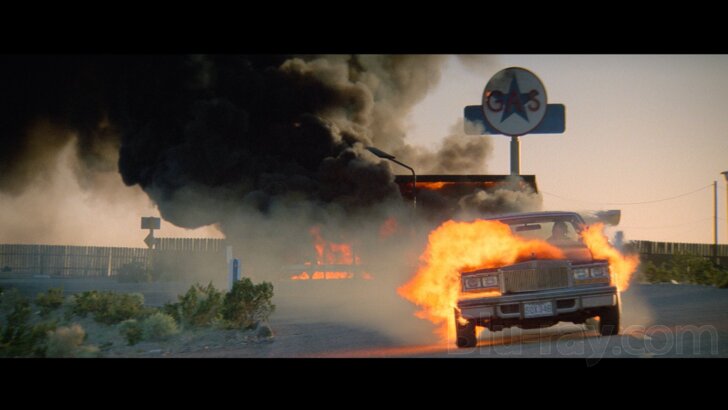
Second Sight's release of The Hitcher is a 4K Blu-ray/Blu-ray combo pack. The 4K Blu-ray and Blu-ray are Region-Free. (On the Blu-ray, there is no problematic PAL or 1080/50i content preceding the main menu).
Please note that some of the screencaptures included with this article are taken from the 4K Blu-ray and downscaled to 1080p. Therefore, they do not accurately reflect the quality of the 4K content on the 4K Blu-ray disc, including the actual color values of this content.
Screencaptures #1-31 are from the Blu-ray.
Screencaptures #34-40 are from the 4K Blu-ray.
The release introduces an exclusive new 4K makeover of The Hitcher, supervised and approved by director Robert Harmon. In native 4K, the 4K makeover can be viewed with Dolby Vision and HDR grades. I chose to view it with Dolby Vision. Also, I viewed the entire 1080p presentation of the film on the Blu-ray.
I received this deluxe combo pack on Wednesday, and after viewing the 4K makeover in native 4K, I decided to see it in its entirety in 1080p. I did so on Friday. Unfortunately, I have to report that I found both presentations to be equally unconvincing.
In native 4K and 1080p, the entire film boasts a predictably healthy appearance. In many areas, delineation, clarity, and depth are very good, often even excellent. Image stability is great, too. However, both presentations are digital interpretations of the original look of the film, and both are problematic. Why? Because they are graded quite awkwardly. For example, various ranges of blue nuances and occasionally even primary blue are shifted toward turquoise, causing anomalies that can be very distracting. Some of the most prominent ones emerge during daylight footage, where the skies acquire a very unnatural light, turquoise/greenish neon-esque appearance. You can see examples here and here. However, the effects of the shift(s) are easily recognizable in other places as well. For example, primary blue on the bus seats is altered here. These shifts can affect even shadow definition, so in certain areas it becomes either extremely difficult or virtually impossible to see finer darker nuances and details. After viewing the 4K and 1080p presentations in their entirety, I compared different daylight and darker sequences and must say that there are obvious trade-offs that are frustrating, too. For example, several outdoor sequences look slightly better balanced and more attractive in native 4K. (The face-off in the desert at the end of the film is a prime example). However, in native 4K, the Dolby Vision grade makes some of the darker/nighttime footage way too dark. (The initial encounter between Rutger Hauer and C. Thomas Howell has several problematic spots). On the other hand, in 1080p, several darker sequences tend to reveal slightly more of the darker nuances, but grain becomes quite loose there. Also, the majority of the outdoor footage where the blues are overwhelmed or replaced by turquoise looks worse in 1080p. All of these alterations have an undeniable impact on the color temperature of all visuals, so a lot of material that should boast proper natural blues, greens, and yellows just does not look right. I did not notice any distracting surface imperfections, like cuts, marks, blemishes, stains, etc.
So, what is the final verdict on the new 4K makeover? It does not have the consistent, convincing, organic appearance of a 1980s film. A few sequences here and there look pretty good, but there is a lot of material that does not. As a result, large parts of it have the stylized appearance of a contemporary project that was graded digitally.
The Hitcher 4K Blu-ray Movie, Audio Quality 
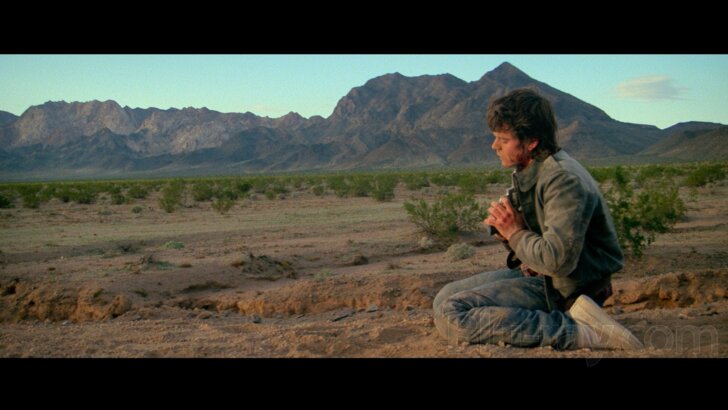
There are two standard audio tracks on this release: English DTS-HD Master Audio 2.0 and Dolby Atmos. Optional English SDH subtitles are provided for the main feature. When turned on, they appear inside the image frame.
I chose to view the entire film with the DTS-HD Master Audio 2.0, but later tested different parts of it with Dolby Atmos track. I could not be happier with the former. Its dynamic intensity is outstanding, and because the film has plenty of wonderfully shot action material, it is very easy to be impressed by it. The dialog is very clear, sharp, and easy to follow. If there were any age-related imperfections before, now it is impossible to tell. The Dolby Atmos track is very potent, so crashes and explosions sound mighty impressive. However, in some areas -- like the one where Rutger Hauer destroys the gas station -- it feels like it does a bit too much. The terrific music sounds great on both tracks.
The Hitcher 4K Blu-ray Movie, Special Features and Extras 
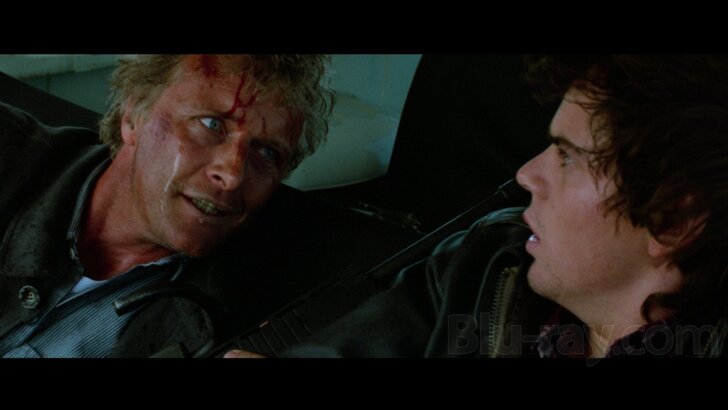
4K BLU-RAY DISC
- Commentary One - this exclusive new audio commentary was recorded by critic Alexandra Heller-Nicholas.
- Commentary Two - this audio commentary was recorded by director Robert Harmon and screenwriter Eric Red.
- Commentary Three - this scene-specific audio commentary was recorded by Robert Harmon, Eric Red, executive producer Edward S Feldman, composer Mark Isham, cinematographer John Seale, and Rutger Hauer and C Thomas Howell.
- The Projection Booth Podcast - this archival program features Robert Harmon and Rutger Hauer.
- Bullseye - in this new program, Robert Harmon discusses the unique qualities of The Hitcher, Rutger Hauer's intense performance, and how the film has aged. Also, there are some quite interesting comments about the screenplay Eric Red delivered. In English, not subtitled. (42 min).
- Penning the Ripper - in this new program, Eric Red discusses the early stages of his career and how the original idea for The Hitcher materialized. (Duel and Race with the Devil were apparently major inspirations). Also, there are some interesting comments about the similarities and differences between the original screenplay for The Hitcher and the film Robert Harmon shot. In English, not subtitled. (42 min).
- Doomed to Live - in this new program, C. Thomas Howell discusses the exact period in which he agreed to do The Hitcher and the shooting process. There are some particularly interesting comments about Rutger Hauer's performance and his behavior when the camera was not rolling. In English, not subtitled. (29 min).
- The Man From Oz - in this new program, cinemaotgrapher John Seale recalls how he was offered to lense The Hitcher and what it was like to work with Robert Harmon. Seale explains that at the time he thought that The Hitcher had a very particular Sam Peckinpah-esque quality. In English, not subtitled. (10 min).
- A Very Formative Score - in this new program, composer Mark Isham discusses his musical background, the evolution of his style, and contribution to The Hitcher. In English, not subtitled. (16 min).
- Duel Runner - in this visual essay, Leigh Singer highlights some similarities between The Hitcher and Duel. In English, not subtitled. (20 min).
- China Lake (1983) - presented here is Robert Harmon's short film China Lake. Remastered. LPCM 1.0. 1080p. In English, not subtitled. (35 min).
- The Calling Card - in this new program, Rover Harmon discusses China Lake and its history. In English, not subtitled. (16 min).
- Telephone (1986) - presented here is Eric Red's short film Telephone. Upscaled. Dolby Digtal 2.0. In English, not subtitled. (27 min).
- The Hitcher: How Do These Movies Get Made? - an archival program about the production and genre identity of The Hitcher, featuring clips from interviews with Robert Harmon, Eric Red, Rutger Hauer, C. Thomas Howell, and executive producer Edward S. Feldman, amongst others. The program was produced by German label Kinowelt. In English, not subtitled. (39 min).
- Trailers - presented here are three vintage trailers for The Hitcher. In English, not subtitled. (6 min).
- Commentary One - this exclusive new audio commentary was recorded by critic Alexandra Heller-Nicholas.
- Commentary Two - this audio commentary was recorded by director Robert Harmon and screenwriter Eric Red.
- Commentary Three - this scene-specific audio commentary was recorded by Robert Harmon, Eric Red, executive producer Edward S Feldman, composer Mark Isham, cinematographer John Seale, and Rutger Hauer and C Thomas Howell.
- The Projection Booth Podcast - this archival program features Robert Harmon and Rutger Hauer.
- Bullseye - in this new program, Robert Harmon discusses the unique qualities of The Hitcher, Rutger Hauer's intense performance, and how the film has aged. Also, there are some quite interesting comments about the screenplay Eric Red delivered. In English, not subtitled. (42 min).
- Penning the Ripper - in this new program, Eric Red discusses the early stages of his career and how the original idea for The Hitcher materialized. (Duel and Race with the Devil were apparently major inspirations). Also, there are some interesting comments about the similarities and differences between the original screenplay for The Hitcher and the film Robert Harmon shot. In English, not subtitled. (42 min).
- Doomed to Live - in this new program, C. Thomas Howell discusses the exact period in which he agreed to do The Hitcher and the shooting process. There are some particularly interesting comments about Rutger Hauer's performance and his behavior when the camera was not rolling. In English, not subtitled. (29 min).
- The Man From Oz - in this new program, cinematographer John Seale recalls how he was offered to lense The Hitcher and what it was like to work with Robert Harmon. Seale explains that at the time he thought that The Hitcher had a very particular Sam Peckinpah-esque quality. In English, not subtitled. (10 min).
- A Very Formative Score - in this new program, composer Mark Isham discusses his musical background, the evolution of his style, and contribution to The Hitcher. In English, not subtitled. (16 min).
- Duel Runner - in this visual essay, Leigh Singer highlights some similarities between The Hitcher and Duel. In English, not subtitled. (20 min).
- China Lake (1983) - presented here is Robert Harmon's short film China Lake. Remastered. LPCM 1.0. 1080p. In English, not subtitled. (35 min).
- The Calling Card - in this new program, Rover Harmon discusses China Lake and its history. In English, not subtitled. (16 min).
- Telephone (1986) - presented here is Eric Red's short film Telephone. Upscaled. Dolby Digtal 2.0. In English, not subtitled. (27 min).
- The Hitcher: How Do These Movies Get Made? - an archival program about the production and genre identity of The Hitcher, featuring clips from interviews with Robert Harmon, Eric Red, Rutger Hauer, C. Thomas Howell, and executive producer Edward S. Feldman, amongst others. The program was produced by German label Kinowelt. In English, not subtitled. (39 min).
- Trailers - presented here are three vintage trailers for The Hitcher. In English, not subtitled. (6 min).
- Book - a 200-page hardback book with exclusive Robert Harmon interview by Lou Thomas, exclusive Eric Red interview by Matthew Thrift, new essays by Heather Drain, David Kittredge, Craig Ian Mann, Rebecca McCallum, Meagan Navarro and Jon Towlson, archival Fangoria article, and behind the scenes photo gallery, and technical credits.
- Screenplay - Eric Red's original screenplay book.
- Collectible Cards - six art cards.
The Hitcher 4K Blu-ray Movie, Overall Score and Recommendation 
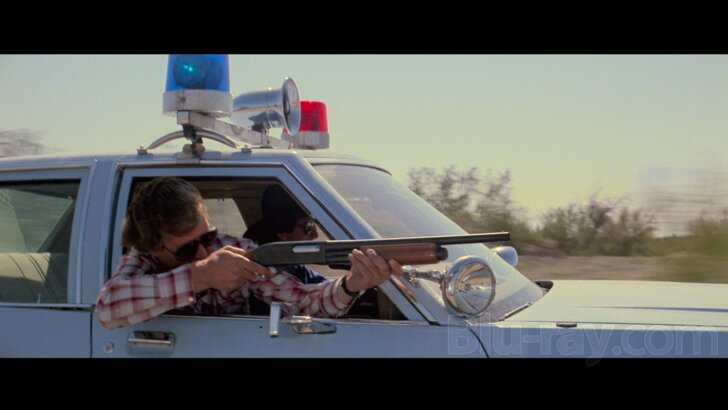
It is not an exaggeration to state that the 4K makeover of The Hitcher and its transition to 4K Blu-ray and Blu-ray is one of the year's biggest events -- or at least as far as film collectors are concerned. The Hitcher is a true cult film, and a proper high-definition release of it was desperately needed. Second Sight's combo pack is obviously a labor of love, but I found the 4K makeover that was prepared for it unconvincing. While The Hitcher looks very healthy now, it does not have the proper appearance of a genre film from the 1980s. If you reside in North America and wish to have a local home video release of The Hitcher in your library, Warner Bros. Home Entertainment's upcoming 4K Blu-ray and Blu-ray releases should be on your radar.
Similar titles
Similar titles you might also like

Wolf Creek 2
Director's Cut
2013

Incident in a Ghostland
2018

Candyman
1992

The Texas Chain Saw Massacre 4K
Remastered
1974

No One Lives
2012

Child's Play
1988

Southbound
2016

Zombie Hunter
2013

Halloween 4K
2018

Halloween V: The Revenge of Michael Myers
Halloween 5
1989

High Tension
Haute tension
2003

I Spit on Your Grave
2010

Child's Play
2019

The Boy
2016

Halloween II
Halloween 2
2009

Dementia 13
Director's Cut | Vestron Collector's Series
1963

House at the End of the Street
2012

American Mary
2012

Smiley
2012

Friday the 13th: Part II 4K
1981

